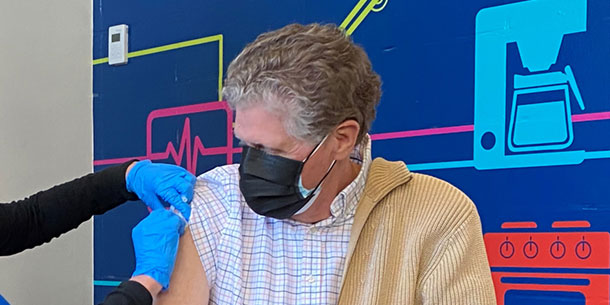
On COVID, why can’t we just say, “Our work is done?”
Although skepticism about Frank Luntz is certainly justified, and although one might worry that the governor gets his news from CNN, it’s encouraging to read that Dan McKee is thinking in these terms:
As McKee spokesman Matt Sheaff tells the story: The governor heard Luntz on CNN “talking about … work he was doing with the Biden administration and polling he was doing on vaccinations, especially in conservative areas of the country.
“He was talking about some strategies … ‘how do we talk to them’ ” — the unvaccinated — ” ‘in a way that they don’t feel attacked’.”
The task at hand calls for convincing, not cudgeling. In keeping with that approach, we read the following:
“The difference this year is that kids are vaccinated, so while teams are not being quarantined as much,” [R.I. Interscholastic League Director Michael] Lunney said. “The most important thing is if you’re vaccinated and you’re not symptomatic, you will not have to quarantine.”
Understandably, Democrats across the country have a difficult position on which to balance. The more vaccination allows a return to life, the more people will be vaccinated (although public health and elected officials have undermined a good deal of their credibility on that claim). However, for political expediency against their opposition, and because a big portion of their base just wants the comfort of knowing government can impose restrictions, Democrats find themselves on the side of fear.
There’s something performative about it all. I volunteered to work a concession stand at Gillette Stadium on Saturday night (where a pro soccer game had a surprisingly large audience), and the masks were few and far between, even on unvaccinated children. Most people understand that they have tools (masks, vaccines, and self isolation) if their tolerance for risk is unusually low. Life can resume.
Indeed, the mystery is why Democrats are refusing to give on some obvious fronts to begin allaying fear. Namely:
- Add people with natural immunity to the mix, which will put the number of people still at risk in a very different light.
- Begin large-scale testing so people (and public health officials) have a real sense of their risks, and make the vaccines available right there when they get their results. The moment they learn they don’t have immunity is a particularly opportune time to give people the option to inoculate themselves.
- Rather than pile on parents’ anxieties with worry about having to make a decision about injecting their very small children with the vaccine, shift the target onto them. One suspects that non-vaccinated parents are likely to be anti-mask parents, and the COVID fear with children is not that they will be greatly harmed, themselves, but that they’ll pass the bug along. So, emphasize that vaccination of adults in the household eases concern about children in the classroom, and set the children free.
Set us all free. Individuals have the tools to all but ensure that they will not suffer greatly from COVID-19, and adults have a right to bear their own risks. Somewhere between 70 and 90% of all Rhode Islanders (including children) have vaccine or natural immunity, at this point. The rest can make their own decisions.
Featured image of Governor Dan McKee being vaccinated from the governor’s website.
